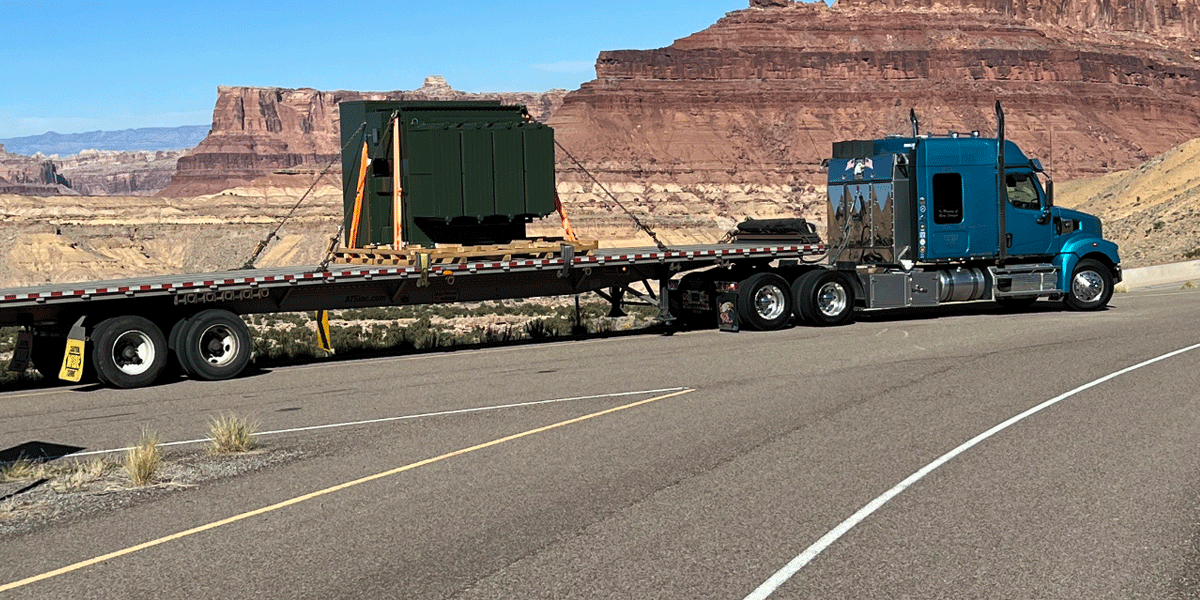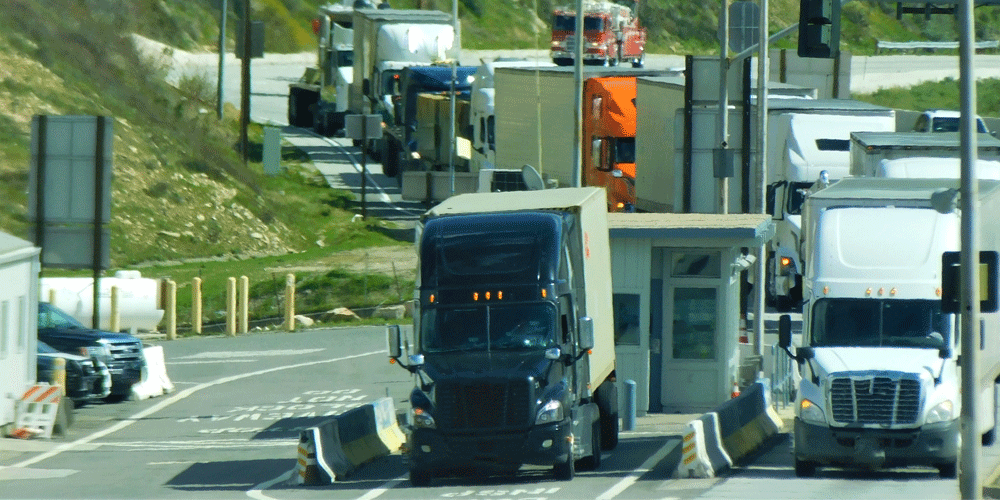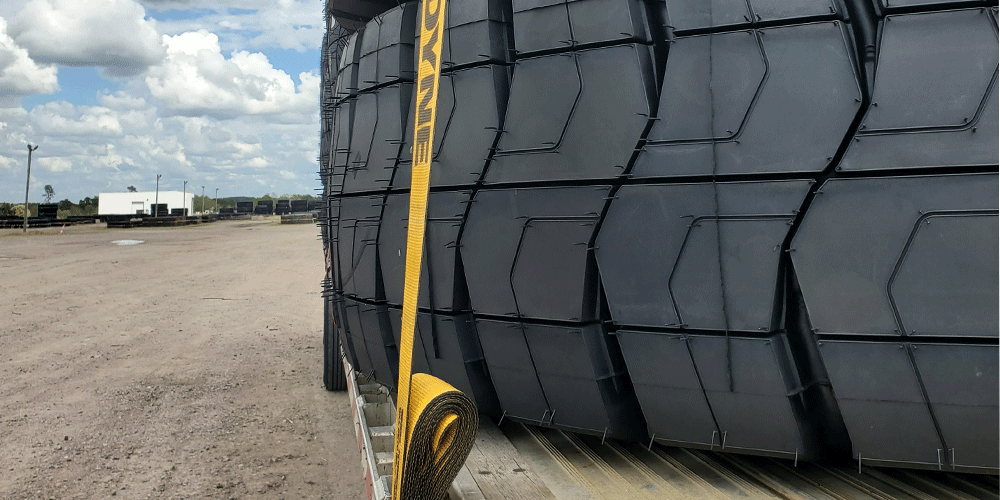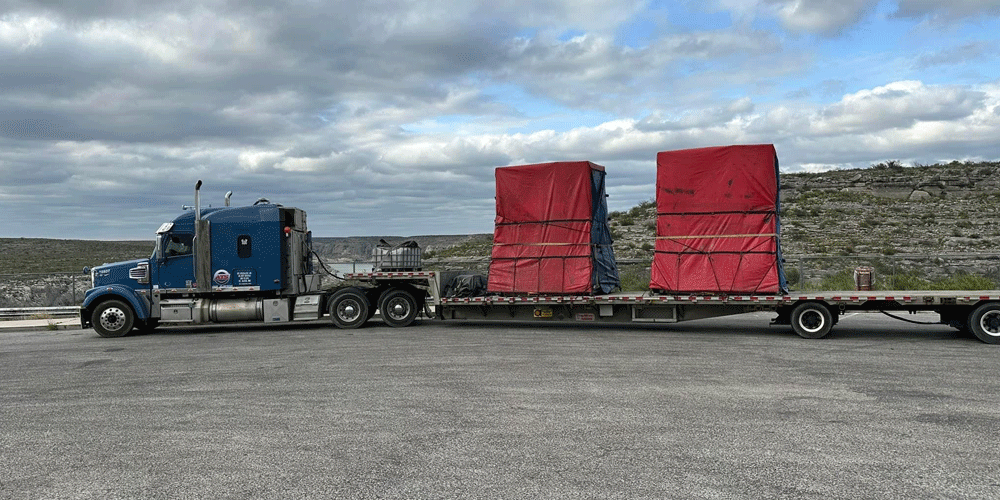Kris is a former truck driver. He joined the ATS team in 2024 as a compliance manager on the safety team.
- What is DOT Blitz Week?
- When is blitz week this year?
- What are inspectors focusing on this year?
- How can I prepare as a driver to pass the inspection?
Each year, the Commercial Vehicle Safety Alliance (CVSA) announces several blitzes. A blitz is a concentrated effort by the CVSA to ensure trucks and drivers are safe on the road. Each blitz has a different focus.
The Commercial Vehicle Safety Alliance (CVSA) puts together a series of specialized enforcement events each year.
There's Operation Safe Driver Week in July and Brake Safety Week in August, as well as an unannounced brake safety enforcement program that randomly occurs once during the year.
But the biggest blitz of the year by far is the CVSA International Roadcheck that occurs every May or June. It’s also referred to as DOT Blitz or "blitz week." The tractor, trailer, and driver are inspected as a whole, but officers hone in on a specific part of the tractor each year.
As a former truck driver, I understand the nerves you may be feeling as we quickly approach blitz week. It may even be tempting to take some time off to avoid the extra enforcement, but with some extra attention given to your truck, the blitz is nothing to stress about. In this article, you’ll get answers to all your most pressing blitz week questions.
When you know what to expect from blitz week — and how you can sail through the week unscathed and without a violation — you’ll be a lot more prepared.
What is DOT Week?
DOT Week is the largest enforcement program in the world on commercial motor vehicles. In fact, since its implementation in 1988, nearly 2 million inspections have occurred. An estimated 15 trucks are inspected every minute during the 72-hour blitz in May.
For 72 hours, motor vehicle inspectors and highway patrol officers conduct inspections on commercial motor vehicles at weigh stations, inspection stations, and temporary inspection checkpoints. The International Roadchecks are performed throughout the U.S., Canada, and Mexico to ensure the safety of truck drivers and pedestrians on our roads.
Officers may conduct a level one, level two, or level three inspection. During blitz week, however, the most common inspection is a level one inspection — the most thorough type of inspection that includes the officer going under the truck. It's a whopping 37 steps.
A few of the main areas officers will be looking at include:
- Brake system
- Tires
- Lights
- Engine compartment
- Driver paperwork (CDL, medical card, insurance, etc.)
- Hours of Service (HOS) adherence
Officers also hone in on one driver violation category and one vehicle violation category.
Related: Learn about the six different levels of DOT inspections
When is Blitz Week 2025?
Blitz week 2025 begins the morning of Tuesday, May 13 and ends the evening of May 15.
However, because drivers often take home time during blitz week, they’ve begun putting out extra law enforcement the week before blitz week.
That means a ton of drivers will be inspected the week before the blitz.
What are the Focus Areas of Blitz Week 2025?
This year, the focus of the International Roadchecks will be:
- Driver's false record of duty status (RODS)
- Tires
Keep in mind: Some inspectors may only check these two areas, but you’re still subject to having your entire tractor and trailer inspected along with your driver credentials.
Let's talk about each in turn.
Driver's False Record of Duty Status (RODS)
Hours-of-service (HOS) are in place to limit driving hours and mandate rest breaks for truck drivers. The goal is to protect drivers' rest time and ensure they aren't fatigued on the road. Fatigue is linked to impairments comparable to being under the influence of alcohol. Drivers need to ensure they're following HOS and getting adequate rest.
A key part of maintaining HOS is for truck drivers to record times and duty statuses accurately in their RODS (a log that records driving activity). Failing to accurately maintain the log or to falsify it can result in an out-of-service (OOS) violation. Carriers are even liable to prosecution. Drivers will be placed OOS until the issue is corrected.
According to the International Roadcheck 2025 flyer, in this driver portion of the inspection, inspectors will look for:
- Electronic logging device (ELD) tampering, including driving while not logged in, disconnected devices, and improper edits
- Ghost drivers (claiming a co-driver when no co-driver is present)
- Improper use of the personal conveyance special driving category
- Improper use of other exceptions, including adverse driving conditions
- Recording off-duty time while performing work for a motor carrier or non-motor carrier
In addition to checking your RODS, during the driver portion of the inspection, inspectors will look check the following:
- Driver's documents
- License or commercial driver's license
- Medical examiner's certificate
- Skill performance certificate (if applicable)
- Drug and Alcohol Clearinghouse status (U.S. only)
- Seat belt usage
- Alcohol and/or drug impairment
Check out the driver inspection cheat sheet.
Tires
Tire health is critically important. Tire failure has the potential to harm both drivers and the motoring public. Not only can tire failure be dangerous, but repairing tires on the road can cause significant delays. It's also an expensive issue to fix on the road. Proactive tire health is far less expensive and time-consuming in comparison.
It's no surprise tires are the vehicle focus area of blitz week 2025, especially because tire violations are one of the top causes of OOS violations.
The International Roadcheck 2025 flyer states that officers will look for the following:
- Low tread depth
- Audible air leaks
- Flat tires
- Belt material or casing ply exposed in the tread or sidewall
- Tread or sidewall separation
- Bulges in the sidewall
- Improper repairs, such as rubber-coated plugs in the sidewall
- Items logged between dual tires
What to Expect If It’s Your First Blitz Week
If this is your first blitz week, you might not know what to expect. As you approach a weigh station, it’s safe to assume it will be open. Also, keep your eyes open for “pop-up” inspection sites at pullovers.
However, just because a weigh station is open doesn’t necessarily mean you’ll be inspected. Keeping your truck clean and orderly is always a great way to avoid inspections. If a truck appears to be in rough shape, it’s more likely to get inspected.
If you happen to get a clean inspection either during blitz week, or before it, you’ll be fortunate enough to receive a sticker on your windshield. This communicates the clean inspection to the next weigh station you pull into, helping you avoid yet another inspection (unless something is obviously wrong with the truck or weight).
Because of this, some drivers will request a level one inspection if they’re pulled over just before blitz week. That way, they have the sticker and a “free pass.” (Best to be certain your truck is a-okay!)
If, however, the officer finds something wrong, not only will you (possibly) receive a fine, but, you can be pulled over the next day, risking more fines and potential slowdowns.
If you are selected for an inspection, relax, leave your seatbelt on, and listen to the officer. They will walk you through each step.
If they find a violation, they’ll walk you through the next steps. If the violation is severe enough you may be placed Out of Service (OOS). In that case, you’ll be unable to move the truck until repairs are made.
Regardless of the violation, the points will go on your record and will carry over to your carrier’s Compliance, Safety and Accountability (CSA) score. Having too many violations on your record can significantly impact your hireability. As for your carrier, it can directly impact the customers and freight rates they can secure.
Related: What is a CSA score?
How to Prepare for CVSA International Roadcheck
There’s a reason some drivers take blitz week off. It can be stressful and even a clean inspection will add time to your day. When you’re a truck driver, time is money. However, with a little preparation, you will survive blitz week!
Follow these tips to prepare for blitz week:
Plan for Downtime
When you’re trip planning during blitz week, add some wiggle room to your day. You can expect a roadside inspection to take an hour or so — longer if you have a lot of violations.
Not only that, but you may have to wait to get inspected. It’s not uncommon to wait in line for an inspection during blitz week.
As long as you factor some time at the scale into your trip plan, you don’t have to worry about rushing to your next destination. You’ll have already planned for it. You can expect a delay of at least one day during the blitz.
Don’t set yourself up to fail. The only thing worse than missing a drop-off or pickup because you didn’t plan ahead is making the unsafe decision to rush.
Do Your Pre-Trip Inspections
Pre- and post-trip inspections are a crucial part of your job as a truck driver. They’re also the best thing you can do to prepare for blitz week.
Everything you’re checking during a pre-trip inspection is what officers are checking during a level one inspection.
A good pre-trip inspection should take you about 15 minutes or longer. You should never cut them short, but during blitz week, you really want to take your time with them. Give everything on your tractor and trailer a closer look. Give yourself time to be thorough and find potential violations (and get them fixed) before an officer finds them.
Schedule Your Shop Appointment Now
Try to get in for preventative maintenance now, well before blitz week. If you’ve been holding off on a repair or routine maintenance, schedule it now.
Knowing you have a clean truck going into blitz week will be a weight off your shoulders.
Prepare for Brake Safety Week
Blitz week is just around the corner this year, happening May 13-15, so do your pre-trip inspections and get your truck into the shop now for any pesky little repairs. If you notice something, say something and get it fixed.
Extra law enforcement officers will be on the road before blitz week, so you can expect to be pulled over at any time. As long as you mind your p’s and q’s and follow the tips I provided above, you’ll get through blitz week without any trouble. There’s no need to take the week off.
Coming up shortly after DOT Blitz Week is Brake Safety Week, which you can start preparing for now!





